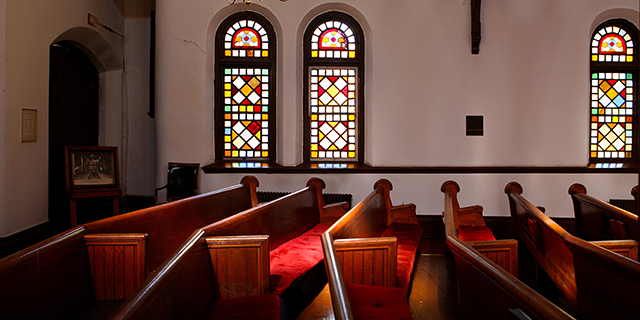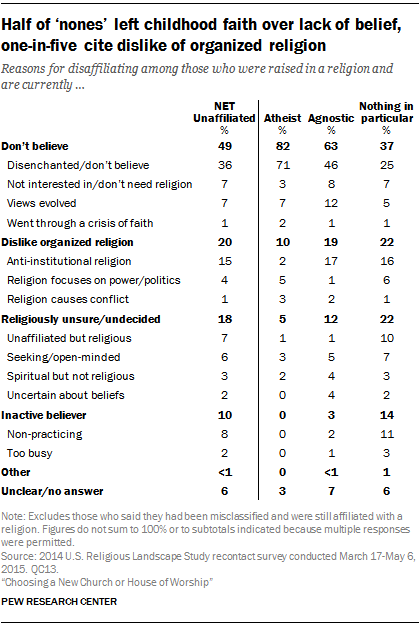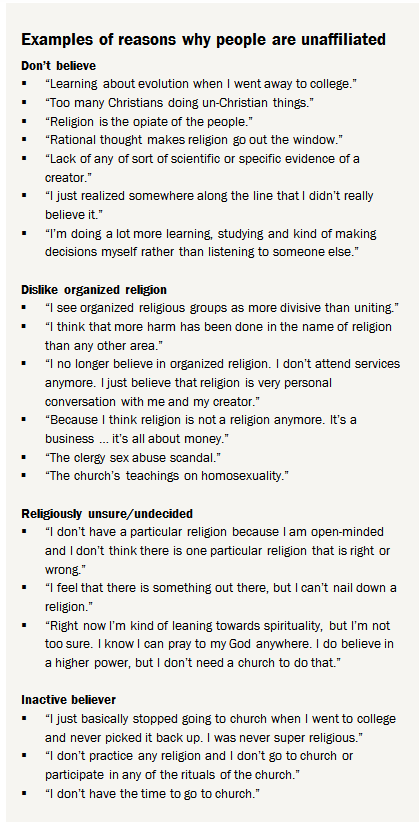How Do The Changing Attitudes Toward Religious Beliefs Encourage Beliefs In The Paranormal?

Perhaps the most striking trend in American religion in recent years has been the growing per centum of adults who practise not identify with a religious group. And the vast majority of these religious "nones" (78%) say they were raised equally a member of a particular religion before shedding their religious identity in machismo.
 As role of a new survey connected to our broader Religious Landscape Study, we asked these people to explain, in their own words, why they no longer identify with a religious grouping. This resulted in hundreds of unlike responses (afterwards all, everyone's religious experience is a bit dissimilar), but many of them shared ane of a few common themes.
As role of a new survey connected to our broader Religious Landscape Study, we asked these people to explain, in their own words, why they no longer identify with a religious grouping. This resulted in hundreds of unlike responses (afterwards all, everyone's religious experience is a bit dissimilar), but many of them shared ane of a few common themes.
About one-half of current religious "nones" who were raised in a religion (49%) indicate that a lack of belief led them to move away from religion. This includes many respondents who mention "science" as the reason they exercise not believe in religious teachings, including one who said "I'chiliad a scientist at present, and I don't believe in miracles." Others reference "common sense," "logic" or a "lack of evidence" – or just say they do not believe in God.
Only at that place are other reasons people give for leaving behind their babyhood faith. One-in-v express an opposition to organized religion in general. This share includes some who exercise not like the hierarchical nature of religious groups, several people who recollect religion is besides much similar a business and others who mention clergy sexual abuse scandals equally reasons for their stance.
 A similar share (xviii%) say they are religiously unsure. This includes people who say they are religious in some style despite beingness unaffiliated (eastward.chiliad., "I believe in God, but in my own fashion"), others who draw themselves as "seeking enlightenment" or "open-minded," and several who say they are "spiritual" if not religious.
A similar share (xviii%) say they are religiously unsure. This includes people who say they are religious in some style despite beingness unaffiliated (eastward.chiliad., "I believe in God, but in my own fashion"), others who draw themselves as "seeking enlightenment" or "open-minded," and several who say they are "spiritual" if not religious.
Ane-in-ten religious "nones" who say they were raised with a religious affiliation are at present classified every bit "inactive" religiously. These people may concur sure religious behavior, just they are not currently taking part in religious practices. And most of them simply say they don't go to church or appoint in other religious rituals, while others say they are too busy for organized religion.
Religious "nones" are by no means monolithic. They can exist broken down into three broad subgroups: cocky-identified atheists, those who call themselves doubter and people who describe their organized religion equally "nothing in particular." Given these unlike outlooks, information technology is not surprising that there are major gaps among these three groups when it comes to why they left their childhood religion behind. An overwhelming majority of atheists who were raised in a religion (82%) say they merely exercise not believe, but this is true of a smaller share of agnostics (63%) and only 37% of those in the "goose egg in item" category.
In fact, while this latter group certainly includes many nonbelievers, it also has substantial shares of people who, alternatively, are opposed to organized religion (22%) or who could exist described as religiously unsure or undecided (22%). And more than one-in-ten people with the "naught in particular" label (14%) say they are either not-practicing or too busy to engage in religious practices, compared with zero atheists in the survey and only three% of agnostics.
Note: The methodology of the recontact survey used in this mail is available here.

Michael Lipka is an editorial manager of religion research at Pew Research Center.
Source: https://www.pewresearch.org/fact-tank/2016/08/24/why-americas-nones-left-religion-behind/
Posted by: carrierfortint.blogspot.com


0 Response to "How Do The Changing Attitudes Toward Religious Beliefs Encourage Beliefs In The Paranormal?"
Post a Comment